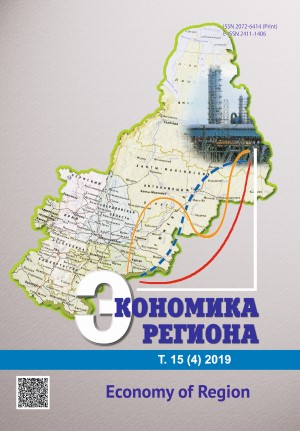ФОРМИРОВАНИЕ ПРОИЗВОДСТВЕННЫХ ОТНОШЕНИЙ В УСЛОВИЯХ СТАНОВЛЕНИЯ ЦИФРОВОЙ ЭКОНОМИКИ
В РОССИЙСКОЙ ФЕДЕРАЦИИ
The Formation of Production Relations in the Context of the Digital Economy Establishment in the Russian Federation
Author(s): Zhanna Anatolevna Ermakova, Igor Nikolaevich KorabeynikovSubject(s): Economy
Published by: Институт экономики Уральского отделения Российской академии наук
Keywords: production relations; digital economy; entities of the Russian Federation; information and economic space; information; data centre; digital product; digital service
Summary/Abstract: The establishment of the digital economy leads to significant changes in the relations in the sphere of material and immaterial production. A significant spatial differentiation, caused by the features of the implemented technological solutions, is observed in the field of digital services. This differentiation greatly impacts the material production’s development. A growing need to use the digital information technologies is transforming the basis of economic development. We hypothesise that the efficiency of production relations is determined not only by known factors, but alsoby the spatial features of the digital economy’s establishment. The study aims to identify the main characteristics, specific features and trends of production relations in the digital economy in the Russian Federation. For various purposes, we used different research methods. Firstly, we applied retrospective analysis for identifying trends in the development of production relations. Secondly, we conducted cluster and factor analysis for classifying the entities of the Russian Federation in accordance with the level of the digital economy’s development. Thirdly, we used quantitative and comparative assessments for analysing the efficiency of production relations’ formation in the entities of the Russian Federation in the context of the digital economy. The empirical basis was data from the Federal State Statistics Service and various rating and analytical agencies, which characterise the development of the digital economy. In the study, we determined the features of the organisation of production relations in the context of the digital economy’s establishment. Information production is the most dynamically developing sphere of the Russian economic activity. At the same time, the growth rate of the market of the digital services’ producers exceeds the growth rates of the markets of consumers and digital services intermediaries in the Russian regions. We revealed that information production mostly concentrates in a limited number of constituent entities of the Russian Federation, including Moscow and the Moscow Region, St. Petersburg and the Leningrad Region. In this regard, it is necessary to establish an information and economic space in the entities of the Russian Federation to provide enterprises with access to digital products, services, and efficient development in the digital economy. Significant spatial differentiation in the level of the digital economy’s development in the constituent entities of the Russian Federation (in the context of the market of intermediaries and consumers) greatly impacts production development. Additionally, it determines the existence of spatial imbalances in the development of the digital economy. The centres for the development of information production are significantly removed from the centres of industrial and agricultural production. Moreover, a large part of the population lives in entities with an average or low level of development of the digital economy. Information production was originally formed as an infrastructure sector of the economy in general and the sphere of material production in particular. Today it is becoming a separate significant element of the economy, while simultaneously performing infrastructure functions. The results of the study allow objective assessments of the features and trends of the formation of production relations in the context of the digital economy in the Russian Federation. The obtained conclusions can be used in the development and implementation of spatial development strategies of the Russian Federation in the context of the digital economy. In addition, the findings can be used by specialists and experts in conducting their own research.
Journal: Экономика региона
- Issue Year: 15/2019
- Issue No: 4
- Page Range: 1199-1211
- Page Count: 12
- Language: Russian

